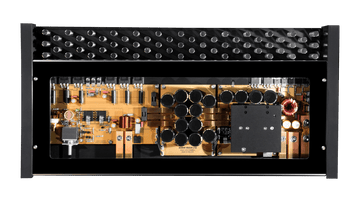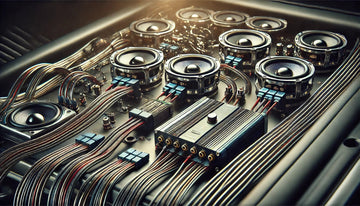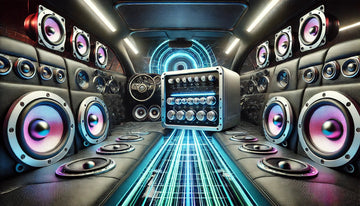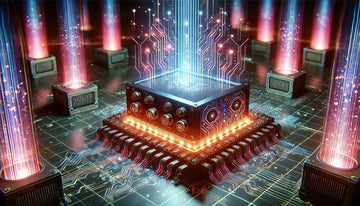Introduction to Amplifier Technology
The Essentials of Car Audio Amplification
Embarking on enhancing your car audio system begins with understanding the pivotal role of car amplifiers. Amplifiers, often the unsung heroes of in-car audio setups, are crucial for boosting the low-level audio signals from your source unit to a level robust enough to move the speakers and create sound. Introducing high-performance car amplifiers, such as the versatile class D amplifier, has revolutionized car audio, enabling clarity and power without older models' bulk and energy drain. With our low-price guarantee and free shipping policy, you can find a suitable car audio amplifier affordably.
Amplifiers: The Powerhouse of Sound Systems
At their core, amplifiers serve one primary purpose – to amplify sound. However, the impact of this function is profound, especially in car audio systems. The choices are vast, from the compact 2-channel amplifier ideal for powering a set of speakers to the more robust 4-channel and 5-channel amplifiers designed for intricate systems. Each amplifier type, be it a mono amplifier for subwoofers or a multi-channel for full-range speakers, uniquely shapes your in-car audio experience. A mono amplifier, designed to power a single speaker, is typically employed to integrate a subwoofer into an existing factory audio system.
The Evolution of Car Amplifiers: From Analog to Digital
The progression from analog to digital amplifiers marks a significant milestone in car audio technology. Digital amplifiers, particularly the Class D models, have increased efficiency and performance. These amplifiers convert audio signals into digital pulses, significantly reducing heat generation and power consumption. Today's digital amplifiers are not just about volume; they deliver quality sound more efficiently and compactly.
In your pursuit of the perfect car audio system, understanding the nuances of amplifier technology is critical. Whether you're in the market for a class AB amplifier for its rich, warm sound or the efficiency of a class D model, knowing your amplifier's role in your audio system is crucial. As you delve deeper into amplifier installation, power ratings, and sound quality, remember that the suitable amplifier can transform your car audio experience from ordinary to extraordinary. Consider these insights as you navigate through amplifier shopping, considering various amplifier brands, reviews, and pricing to enhance your audio system to its full potential.
Types and Classes of Amplifiers
Understanding Different Amplifier Classes: A, B, AB, and D
Navigating the world of car audio amplifiers begins with a fundamental understanding of amplifier classes. Each Class - A, B, AB, and D - represents a unique approach to amplification, balancing sound quality with efficiency. Class A amplifiers, known for their exceptional sound fidelity, are typically less efficient, generating more heat. On the other hand, Class B and AB amplifiers balance efficiency and sound quality, with Class AB being particularly popular for minimizing distortion while maintaining efficiency. The Class D amplifier, a favorite in modern car audio systems, stands out for its high efficiency and compact size, making it an ideal choice for space-constrained car interiors.
Choosing the Right Class: Sound Quality vs. Efficiency
Selecting the suitable amplifier class involves a critical decision between sound quality and efficiency. While high-performance amplifiers like Class A offer unparalleled sound clarity, they may not be the most practical choice for every car audio enthusiast due to their high power consumption. Conversely, Class D amplifiers offer a compact, energy-efficient solution without significantly compromising sound quality. Understanding this trade-off is critical to making a decision well-informed and attuned to your audio tastes and preferences.
Specialty Amplifiers: DSP and Their Role in Audio Enhancement
The realm of car audio amplifiers extends beyond the conventional classes to include specialty amplifiers like those equipped with Digital Signal Processing (DSP). DSP amplifiers with a built-in DSP (digital signal processor), are at the forefront of audio enhancement, providing a level of customization that allows for precise control over the sound. These advanced amplifiers enable users to tailor the audio output to their specific tastes and the acoustics of their vehicle, ensuring an optimal listening experience via an app for your phone or tablet.
In summary, the choice of amplifier - be it a 2-channel amplifier for a simple setup, a versatile 4-channel amplifier for a more comprehensive system, or a powerful mono amplifier (monoblock) for driving subwoofers - Primarily hinges on your individual tastes and the unique requirements of your vehicle's audio system. As you progress with amplifier shopping, remember the importance of amplifier power ratings, sound quality, and features. Whether browsing through car amplifier reviews or considering amplifier pricing, remember that your choice will significantly impact the quality and enjoyment of your audio system. This chapter guides your amplifier-buying journey, helping you decide to enhance your audio system effectively.
Key Features of Car Amplifiers
RMS Power Ratings: Matching Amplifiers with Speakers
When delving into car audio amplifiers, understanding RMS power ratings is crucial. This rating signifies the continuous power an amplifier can output without distortion. Matching your amplifier's RMS power closely with your speakers or subwoofers is essential. An amplifier with adequate power ensures efficient speaker operation, providing clear, distortion-free sound. This careful pairing of amplifiers and speakers based on their RMS ratings is a cornerstone of audio system enhancement.
Signal-to-Noise Ratio and THD: Measuring Sound Purity
Two critical parameters that define amplifier sound quality are the signal-to-noise ratio (SNR) and Total Harmonic Distortion (THD). SNR measures the desired signal level versus background noise, with a higher ratio indicating a more precise sound. THD, on the other hand, refers to the measure of sound distortion introduced by the amplifier. Low THD values are preferable, as the amplifier produces a more accurate reproduction of the original audio. High-performance amplifiers typically boast superior SNR and low THD, ensuring pristine sound quality.
Input Sensitivity and Filters: Tailoring Your Sound
Input sensitivity is a pivotal feature of car stereo amplifiers, determining the input signal needed to reach total output. Proper adjustment of this setting ensures compatibility with various head units and optimal sound output. Additionally, built-in amplifier filters, like low-pass, high-pass, and bandpass, play a significant role in tailoring the audio output. These filters allow for precise control over the frequencies sent to different speakers, enabling customization of the sound stage according to individual preferences.
In summary, understanding and optimizing these critical features of car audio amplifiers - RMS power ratings, SNR, THD, input sensitivity, and built-in filters - are instrumental in enhancing your car's audio system. As you continue your journey through amplifier shopping, consider these aspects alongside factors like amplifier pricing, brands, and reviews. Whether you're considering a Class D amplifier for its efficiency or a multi-channel amplifier for a comprehensive setup, prioritizing these features will guide you toward making a well-informed choice in your amplifier buying guide.
Amplifier Installation and Configuration
Step-by-Step Guide to Installing Your Car Amplifier
Amplifier installation in your vehicle is a pivotal process that can dramatically enhance your audio system's performance. To begin, select an appropriate location for your amplifier, ideally, a spot accessible and safe from potential damage. Ensure the amplifier is securely mounted and has adequate ventilation to prevent overheating.
Next, connect the power cable from the battery to the amplifier, ensuring it is correctly fused for safety. Speaker wires, RCA cables, and a wiring kit should be run from the head unit to the amplifier, avoiding areas that could cause interference or damage to the cables. Additionally, you may need to consider other accessories, such as distribution blocks, fuse holders, or wire connectors, for a complete installation. Finally, connect the ground wire to a solid metal point in the vehicle to complete the circuit.
Configuring Multi-Channel Amplifiers for Optimal Performance
Multi-channel amplifiers, such as 2-channel, 4-channel, and 5-channel amplifiers, offer flexibility in powering speakers. The key to harnessing their full potential lies in the appropriate configuration. For instance, a 4-channel amplifier can power four speakers or be bridged to power two speakers and a subwoofer. Adjust the gain settings to match your head unit's output, and fine-tune the crossover settings based on the types of speakers connected. This ensures each speaker operates within the optimal frequency range, delivering high-performance sound.
Tips for Avoiding Common Installation Mistakes
A successful amplifier installation requires attention to detail to avoid common pitfalls. Ensure all connections are tight and secure to prevent power loss or damage. Avoid running power and audio cables on the same side of the vehicle to prevent noise interference. Always use high-quality cables and connectors for reliable performance and durability. Lastly, consult a professional installer or car amplifier reviews if you're uncertain about any aspect of the installation process. A well-executed installation lays the foundation for an exceptional audio experience in your vehicle.
Incorporating these methods and considerations in amplifier installation and configuration will significantly enhance your car audio system. Whether installing a Class D amplifier for its efficiency or a mono amplifier for robust bass, understanding these fundamental aspects ensures a successful setup.
Remember these tips during your amplifier shopping journey, and refer to a comprehensive amplifier buying guide for additional insights. Your journey to audio system enhancement begins with a well-installed and configured amplifier, paving the way for superior sound quality in your vehicle.
Optimizing Amplifier Performance
Fine-Tuning Your Amplifier for Enhanced Sound Quality
The art of fine-tuning your amplifier is essential for achieving the ultimate audio experience in your car. Adjust the gain settings to synchronize with your head unit's output, ensuring a balance that prevents distortion. Explore the built-in equalizer settings to enhance specific frequencies, catering to the genres of music you prefer.
For instance, a Class D amplifier, known for its efficiency, might need different settings than a Class AB amplifier to achieve the desired sound quality. Pay close attention to the bass boost and low-pass filter for subwoofers, ensuring deep and precise bass tones.
Integrating Amplifiers with Other Car Audio Components
Creating a harmonious audio system involves integrating your amplifier with other components effectively. For multi-channel systems like a 4-channel or 5-channel amplifier, ensure each channel is aligned with the corresponding speaker or subwoofer. In systems with a mono amplifier dedicated to the subwoofer, ensure it is calibrated to complement the full-range speakers, providing a balanced sound. Digital amplifiers offer advanced integration capabilities, seamlessly blending with modern car stereo amplifiers for an immersive audio experience.
What are the benefits of having a car amplifier?
Having a car amplifier enhances the sound quality of your car audio system by providing more power and clarity. It amplifies the audio signal, resulting in louder and fuller sound reproduction. Additionally, car amplifiers allow you to customize and fine-tune your audio experience to suit your preferences.
Maintenance and Upkeep of Your Car Amplifier
Maintaining your car amplifier is crucial for long-term performance. Regularly inspect all connections and cables for signs of wear or damage. Keep the amplifier free of dust and debris to ensure proper ventilation and cooling. Check for any firmware updates in digital amplifiers, which can enhance functionality and performance. For those exploring amplifier shopping or considering amplifier upgrades, reading car amplifier reviews can offer valuable insights into the long-term reliability and maintenance needs of different amplifier brands and models.
This chapter explores essential strategies for optimizing your amplifier's performance, from fine-tuning settings for premium sound quality to integrating it seamlessly with other audio system components. As you embark on amplifier shopping, remember these tips and refer to a comprehensive amplifier buying guide for additional insights.
Whether you're looking for high-performance amplifiers or affordable options with exceptional amplifier sound quality, understanding these optimization techniques is critical to elevating your car's audio system.
Amplifier Selection and Purchasing Tips
Assessing Your Audio Needs: Which Amplifier is Right for You?
Choosing the suitable car audio amplifier is pivotal for an enhanced listening experience. Begin by determining your audio system's goals. Are you aiming for a powerful bass or a balanced sound throughout the vehicle? A mono amplifier or a Class D amplifier can be ideal for robust bass. If you desire a holistic sound, consider a multi-channel amplifier, such as a 4-channel or 5-channel amplifier. It's essential to align the amplifier with your car stereo amplifiers and speakers for seamless integration. Additionally, you can add a low-level sub to your setup if you want modestly better sound quality with more bass and a louder surround. This will further enhance your audio experience.
Budget vs. Performance: Finding the Best Value
While shopping for amplifiers, balancing cost and quality is essential. High-performance amplifiers may have a higher price tag but often offer superior sound quality and longevity. Assess amplifier power ratings and features against your budget. Digital amplifiers, known for their efficiency, might offer a cost-effective solution without compromising quality. Car amplifier reviews can be a valuable resource to gauge the performance-to-price ratio of various models.
Brand Comparison: Evaluating Popular Amplifier Brands
The market is filled with numerous amplifier brands, each with unique strengths. Renowned brands often offer reliability and advanced features in their Class AB and D amplifier lines. When comparing brands, look beyond just amplifier pricing; consider amplifier features such as input sensitivity, filters, and build quality. Audio system enhancement isn't just about the price; but the value and compatibility with your existing system.
This chapter provided practical guidance for selecting the suitable amplifier for your car audio system. From understanding your audio needs to balancing budget and performance and comparing popular brands, these tips are designed to aid you in making an informed decision. Remember, the ideal amplifier should align with your audio aspirations and integrate seamlessly with your existing audio components, offering a harmonious and enhanced sound experience at checkout.
Advanced Amplifier Technologies
DSP Amplifiers: The Future of Customizable Sound
The emergence of Digital Signal Processing (DSP) amplifiers marks a significant evolution in car audio amplifiers. These high-performance amplifiers redefine audio system enhancement, offering unparalleled control over sound.
DSP amplifiers allow users to fine-tune audio settings digitally, ensuring an audio profile that matches personal preferences or compensates for the acoustic limitations of a vehicle. The flexibility of DSP technology in Class D amplifier systems signifies a trend towards more personalized and optimized audio experiences in car stereo systems.
The Impact of Digital Streaming on Amplifier Technology
Integrating streaming capabilities in-car audio systems has become increasingly prevalent in the digital amplifiers and streaming era. Bluetooth amplifiers are now incorporating features that support digital streaming, enhancing the compatibility of amplifiers with modern audio sources.
This shift highlights the importance of selecting an amplifier that provides excellent sound quality and aligns with the latest digital trends, ensuring seamless integration with various digital media formats.
Innovations in Energy Efficiency and Compact Design
Energy efficiency and compact design are at the forefront of amplifier innovation. Modern Class AB amplifier and Class D amplifier models are designed to deliver powerful performance while remarkably energy-efficient. This evolution is particularly notable in mono and multi-channel amplifiers, such as 2-channel and 4-channel amplifiers.
Additionally, the push towards more compact designs makes amplifier installation more manageable and versatile, particularly in vehicles where space is at a premium. These innovations enhance amplifiers' practicality and contribute to the broader efforts towards eco-friendly technology in the automotive industry.
In this chapter, we've explored the cutting-edge technologies shaping the future of car audio amplifiers. From the customizable soundscapes offered by DSP amplifiers to the integration of digital streaming and the strides made in energy efficiency and design, these advancements are setting new standards in the car audio domain. As we continue to witness these innovations, it's clear that amplifiers are not just about amplifying sound anymore—they're about elevating the entire audio experience.
FAQs: Your Amplifier Questions Answered
What to Look for When Buying a Car Amplifier?
When embarking on amplifier shopping, the variety of options can be overwhelming. Key factors to consider include the Class of amplifier, such as Class D or Class AB, and whether a 2-channel, 4-channel, or mono amplifier suits your system best. High-performance car amplifiers with higher amplifier power ratings offer more robust sound, but balancing power with your car's electrical capacity is crucial. Look for car amplifiers with a solid reputation for amplifier sound quality, as indicated in car amplifier reviews, and compare amplifier features across various brands. Additionally, it is vital to consider a full-range car amplifier that can provide a wide frequency response and cover the entire audio spectrum, ensuring that all frequencies are reproduced accurately.
How to Balance Power Handling Between Amplifiers and Speakers?
The right balance between your car amplifier and speakers is critical for optimal audio performance. Ensure that the RMS power ratings of the amplifier match or exceed that of your speakers to avoid distortion. Class D amplifiers are known for their efficiency and are ideal for systems requiring high power. When considering multi-channel amplifiers, like a 5-channel amplifier, ensure each channel is adequately powered for the connected speaker.
Can I Upgrade My Amplifier Without Changing Other Components?
Upgrading your amplifier without altering other components is possible, but careful consideration is needed. Your new amplifier should complement the existing audio system enhancement. For instance, check compatibility with your car stereo amplifiers and speakers when upgrading to a digital amplifier. Amplifier installation should also be re-evaluated to accommodate the new unit's power requirements and dimensions.
In this chapter, we addressed common queries related to car audio amplifiers. Understanding what to look for in amplifier types, balancing power handling, and upgrading components is essential to enhance your car audio experience. With the proper knowledge, amplifier shopping becomes a guided journey toward achieving the ultimate sound quality in your vehicle.
Future Trends in Car Amplifiers
The Next Generation of Car Amplifiers: What to Expect
The future of car audio amplifiers is poised for exciting advancements. Expect a surge in Class D amplifier technology, renowned for its efficiency and compact design. These amplifiers will likely dominate the market, offering high-performance capabilities with minimal power drain. Car audio enthusiasts can anticipate amplifiers that are more powerful and smarter, with integrated digital technology for enhanced audio customization.
How Advancements in Technology are Shaping Car Audio
Digital amplifiers are set to revolutionize car stereo systems. Their ability to digitally process sound allows for more transparent, precise audio output. Future car audio amplifiers will likely feature advanced digital signal processing (DSP), enabling users to fine-tune their audio experience more precisely. Additionally, with the growing trend of streaming music, digital amplifiers are expected to integrate seamlessly with various digital streaming platforms, enhancing the in-car entertainment experience.
The Growing Importance of Eco-friendly Amplifier Designs
As environmental consciousness grows, eco-friendly designs become crucial in the car amplifier market. Future car amplifiers will likely focus on energy efficiency, reducing the carbon footprint without compromising sound quality. This shift will also see the development of more compact amplifier models, reducing material use and waste. The trend towards green technology in car audio amplifiers aligns with the broader automotive industry's move towards sustainability.
In this chapter, we delved into the future of car amplifiers, highlighting the expected trends and innovations. The evolution of car amplifier technology, from Class D amplifiers to eco-friendly designs, demonstrates the industry's commitment to enhancing audio experiences while adapting to changing consumer needs and environmental responsibilities. As technology advances, car amplifiers will continue to be vital in delivering superior sound quality in vehicles.
Conclusion: Elevating Your Audio Experience with Amplifiers
The Integral Role of Amplifiers in Car Audio Systems
In car audio, amplifiers are pivotal in enhancing the overall listening experience. Their ability to amplify sound without distortion makes them indispensable in any high-quality car audio system. From the robust power of Class D car amplifiers to the nuanced sound reproduction of Class AB amplifiers, each type of amplifier brings its unique qualities to the table. Whether it's a 2-channel car amplifier for a simple setup or a more complex 5-channel amplifier for a comprehensive system, amplifiers are the cornerstone that drives high-performance audio.
Embracing the Future: The Ongoing Evolution of Amps
The journey of car amplifiers from analog to digital represents the continuous evolution of audio technology. Today's digital car amplifiers are about loudness and delivering crisp, precise, and nuanced sound. The integration of DSP (Digital Signal Processing) in car amplifiers is a testament to this evolution, offering unprecedented control over audio output. As we look to the future, we anticipate further advancements in amplifier technology, including more efficient designs and even better integration with digital media and streaming services.
Amplifiers: A Key Investment in Superior Sound Quality
Investing in a high-quality car amplifier is an investment in superior sound quality. Car audio enthusiasts know that a suitable car amplifier can make all the difference in achieving the perfect audio experience. When shopping for an amplifier, considering factors like car amplifier power ratings, sound quality, and the specific features of different amplifier brands is crucial. Car amplifier reviews and comprehensive amplifier buying guides are invaluable in making an informed decision. Remember, a sound amplifier enhances the audio system and elevates your driving experience.
In conclusion, car amplifiers, or amps, are vital to any high-quality audio system. Their ability to enhance and refine sound quality makes them a crucial investment for any car audio enthusiast. As technology advances, we can expect amplifiers to become even more sophisticated, offering superior sound quality and more features. As we embrace these advancements, the role of amplifiers in-car audio systems will continue to be integral, ensuring that every journey is accompanied by exceptional sound. Car amplifiers are essential for standalone car subwoofers requiring lots of power.





